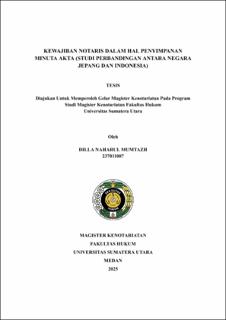| dc.description.abstract | Notaries in Indonesia and Japan have the authority to make deeds and have the liability to
keep them as deed minutes as part of the Notary Protocol. Regarding the storage of the
Minute of Deed in Indonesia, it is still conventional, this raises a number of problems that are
closely related to the interests of the confronters as parties who need the Minute as evidence.
Whereas Indonesia itself is in the era of globalization by being able to take advantage of the
great potential of information and communication with paperless electronic media, such as
Japan, which stores the Minute of Deed in 2 (two) ways, namely conventionally and
electronically, which has perfect evidentiary power, storage in this way makes it easier for
various parties, both from the parties concerned and notaries and from the Ministry of Justice.
The problems raised in this research relate to the authority of Notary in terms of carrying out
his position to make a Deed to store it as a Minute Deed in Indonesia and Japan, the form of
implementation of storing the Minute Deed of Notary in Indonesia and Japan, and the
application of digital society 5.0 in Japan in terms of storing the Minute Deed of Notary,
which can be applied in Indonesia in the future. This research generally aims to examine and
analyze the form of storage of the Minute of Deed, which is carried out conventionally and
electronically. Given that technological progress has been so rapid that it can no longer be
avoided, and the use of technology is more effective, efficient, and low-cost for humans in
doing their work. The research method used in this writing is normative juridical in nature
because it is analyzed as the basis of research that positions the law as a system of norms
carried out to analyze and assess positive law with a comparative approach and statutory
approach between the laws of two countries, namely Japanese Notary Law No. 53 of 1908 jo.
Japanese Notary Law No. 74 of 2011 with Law No. 2 of 2014 jo. Law No. 30 of 2004 on the
Office of Notary. The result of the research is that Indonesia must learn from Japan to
improve the storage system of the Minute of Deed and the need for infrastructure that
supports the creation and storage of electronic and conventional Minute of Deeds, as well as
harmonizing existing regulations before implementing a conventional and electronic notary
system as in Japan. | en_US |


